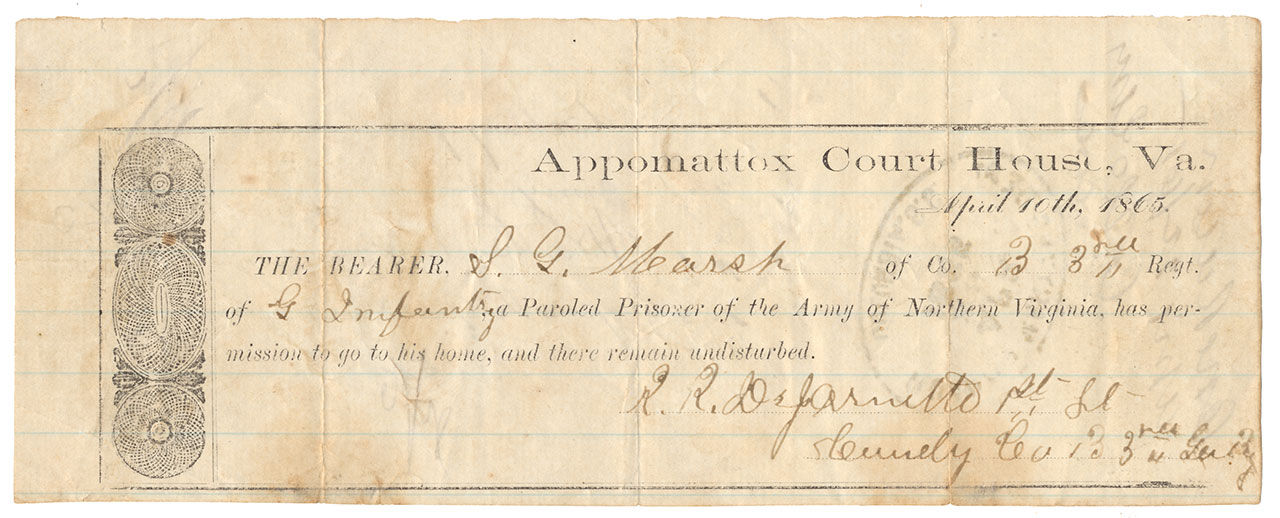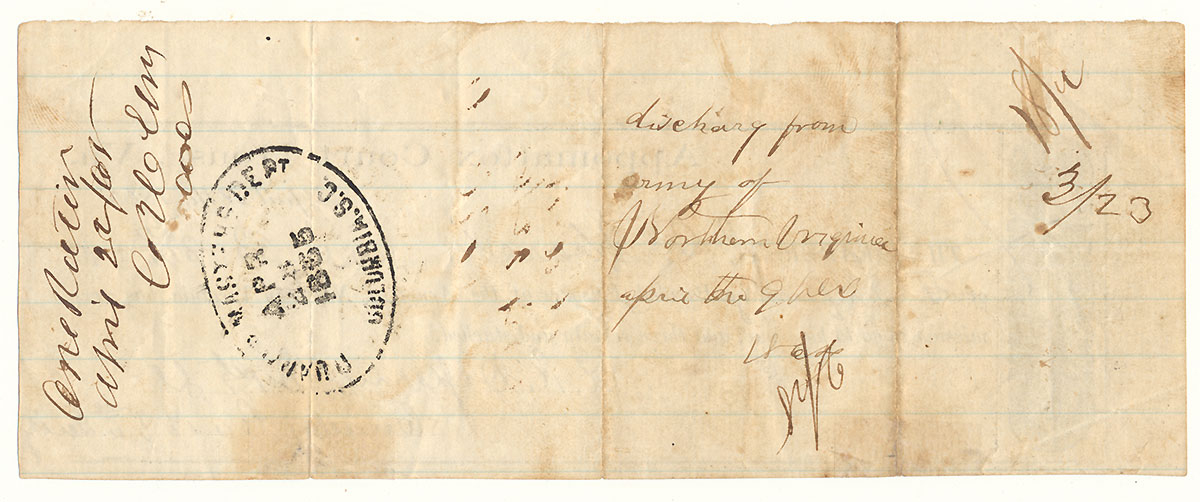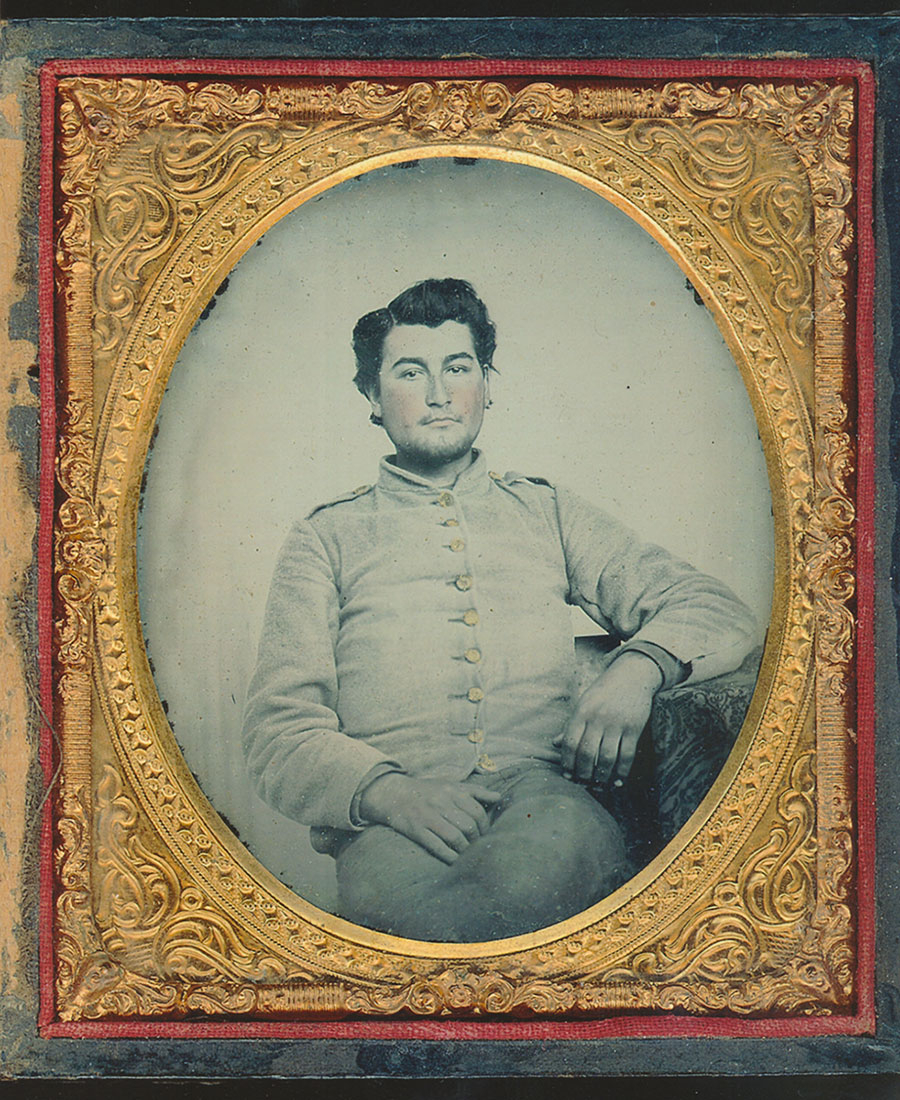site search
online catalog
APPOMATTOX PAROLE OF SAMUEL GIDEON MARSH, COMPANY B 3rd GEORGIA INFANTRY

Hover to zoom



$5,500.00
Quantity Available: 1
Item Code: 1300-70
Shipping: Determined by Method & Location of buyer
To Order:
Call 717-334-0347,
Fax 717-334-5016, or E-mail
A very good condition Appomattox parole from the collection of historian and author Greg Coco. This bears one of the three standard edge designs found on the these near the left edge and bears the correct preprinted text, “Appomattox Court House, Va. / April 10th, 1865/ The bearer _____ of Co. _____ Regt. of _____ , a Paroled Prisoner of the Army of Northern Virginia has permission has permission to go to his home and there remain undisturbed,” with space left at bottom right for the soldier’s commanding officer. It is filled out for S.G. Marsh of Company B of the 3rd Regt “G Infantry” and signed at lower right by “R.R. DeJarnette, 1st Lt. / Comdng Co. B 3rd Ga Infty.”
There are just minor, shallow vertical folds. The printed portions and ink additions are fully legible. The reverse bears a couple of handwritten notations such as “3/23,” whose meaning is unclear, and a note that Marsh wrote somewhat later: “discharge from army of Northern Virginia April the 9th 1865,” which it, effectively, was. There is also the period, handwritten official notation that he had received “One Ration” on April 22/65, along with an oval ink stamp below that dated April 28, 1865, at Columbia, SC, with the top line blurred, but apparently coming from a US Quartermaster, likely indicating another issue of rations for his journey home. These issues, along with transportation home, were among the terms offered by Grant (and later followed by other US commanders) that not only eased the surrender, but prevented prolongation of the war, the potential break up of Confederate armies into roving bands, etc. See Coco’s article on Appomattox paroles in Civil War Times (March/April 2006) and also Winik’s “April 1865: The Month That Saved America,” for further insight on how the surrender terms helped effect, to some degree, and hardly without problems, a national reconciliation.
The 3rd Georgia Infantry dated back to April 1861, with service around at Portsmouth, Roanoke, etc. Marsh, a miller by occupation, joined them when they reorganized in May 1862 for Confederate service. The best summary of his service is provided by his own statement on his “Record of Soldier or Sailor in the Confederate or State Service from Georgia,” photocopies of which are in a large research file accompanying the parole. Marsh enlisted at age 20 at Eatonton, Ga., on May 15, 1862, as a private in Company B, the “Brown Rifles,” and served until paroled at Appomattox. He listed the engagements in which he served as: “Malvern Hill, 2nd Manassas, the surrender of Harpers Ferry, Sharpsburg of Antietam, Fredericksburg, Chancellorsville, Wilderness, Spottsylvania Courthouse, Deep Bottom, Blow up at Petersburg, Hatchers Run, Brista Station, Reams Station, 2 engagements on Weldon RR 22nd June 64 in front of Petersburg and at Culpeper C.H. besides having been left on picket on evacuating Petersburg and being one of the rearguard of the retreating army. We were engaged every day for 8 days fighting more or less every day until the surrender. Never was absent from the army from 15 May 62 to 9th April 65, but 24 days furlough. Never saw inside of hospital during the war.”
Also the research file are copy photos of a 6th plate image of Marsh in uniform (half-length, seated, in 9-button gray uniform jacket) retained by a great-grandson of Marsh, along with copies of other material he shared with Greg Coco, including Marsh’s service records, records of his stay in a Confederate soldiers’ home, a 25-page history of service by the great-grandson, incorporating Marsh’s service in the record of the regiment, along with photocopies of Marsh’s March 1864 furlough, photos of Marsh in later life, etc. Interestingly, Marsh did not mention that he was wounded, slightly, at Chancellorsville. He also boasted of never seeing the inside of a hospital during his service, which may be literally true, but according to his great-grandson in a letter to Greg Coco, a soldiers’ home file entry indicates he missed the fighting at Gettysburg due to sickness, perhaps being among those falling ill on the campaign and thus cared for by medical personnel in the field, but not hospitalized.
Marsh returned home, married twice after the war and died in the Confederate Veterans Home in Atlanta in 1920. The file with this is quite extensive. [sr][ph:L]
~~~~~~~~~~~~~~~~~~~~~~~~~~~~~~~~~~~
THIS ITEM, AS WITH ALL OTHER ITEMS AVAILABLE ON OUR WEB SITE,
MAY BE PURCHASED THROUGH OUR LAYAWAY PROGRAM.
CLICK HERE FOR OUR POLICIES AND TERMS.
THANK YOU!
Inquire About APPOMATTOX PAROLE OF SAMUEL GIDEON MARSH, COMPANY B 3rd GEORGIA INFANTRY
Most Popular
Historical Firearms Stolen From The National Civil War Museum In Harrisburg, Pa »
Theft From Gravesite Of Gen. John Reynolds »
Selection Of Unframed Prints By Don Troiani »
Fine Condition Brass Infantry Bugle Insignia »
featured item
10” CONFEDERATE COLUMBIAD CANNON-TREDEGAR IRON WORKS - FORMER TEXAS MUSEUM
This large cast-iron cannon was produced at the Tredegar Iron Works in Richmond, Va. In 1836, a group of Richmond businessmen and industrialists led by Francis B. Deane, Jr. set about to capitalize on the growing railroad boom in the United… (1268-1240). Learn More »


